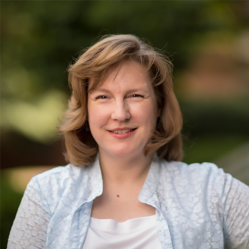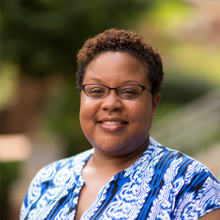By Brittany Phillips
Since its inception in 2007, the Biological and Biomedical Sciences Program (BBSP) has established itself as a trusted umbrella program for faculty and students helping the UNC School of Medicine attract hundreds more high-quality applicants than it ever has. Twelve years later, UNC BBSP has become a national example of how to begin the training of top-tier scientists, even those who do not go on to run labs of their own.
Susanna Harris, a sixth-year graduate student in the microbiology and immunology program, knew early on that choosing a school with a strong BBSP was the best fit for her.
“In high school I took an AP biology class. We took about three days understanding bacteria and it just clicked for me. I thought that was the coolest thing I had ever heard about,” said Harris. “My dad was a high school biology teacher and that really shaped how I saw the world. He never shut me down from asking questions and in fact, when I had questions he would not answer them and I was forced to do that kind of work myself.”
Harris began undergrad at the University of Iowa where she had access to a microbiology program. While studying soil bacteria she had the opportunity to work in a lab which really piqued her interest. She realized that seeking a PhD was the next step. After five interviews at different universities, she chose UNC with an interest in the Biological and Biomedical Sciences program.
“I tried to focus on applying to places that had umbrella programs because of my experience in undergrad. I knew I wanted to have that broad range of options. I also knew, that way, I could interact with other students across different disciplines and learn more about what I wanted to do after graduation,” said Harris.
Through BBSP, students from all walks of life get the opportunity to rotate through different labs they choose within the 14 affiliated PhD programs. Now with recruiting its 12th class, BBSP has proved to be a great choice for aspiring scientists.

“Before BBSP, if you added up all the programs, we had about 863 applications in 2007,” said Jean Cook, PhD, associate dean for graduate education and professor of biochemistry and biophysics. “Some programs got lots of applicants, some didn’t. Last year, we received more than 1,700 applicants, and this year we have a new record of 1,903. Admissions has become harder not just because the number of applicants has gone up, but the number of highly qualified applicants has gone way up.”
What makes BBSP so attractive to applicants is its flexibility. During their first year, students join one of several small first-year groups which meet regularly to develop critical thinking skills and other professional skills relating to research success and scientific communications such as writing and speaking.
“Here, the students rotate through three labs in their first year, choose a lab, and a PhD program, and that program then has academic control. Labs will then take on funding commitment, including student insurance, stipend, tuition, and fees until they graduate,” said Cook.
“I used the BBSP umbrella to take a bunch of different classes,” said Harris, who works in the lab of Elizabeth Shank, PhD, in the department of microbiology and immunology. “I took an advanced biochemistry class that was really interesting, but it helped me figure out that biochemistry wasn’t my passion. I got to take some computer coding classes and it was really useful.”
Prior to 2008, when each PhD program ran its own first year process, students could only rotate between three labs in the same program. It worked well, and each program was able to closely scrutinize how they spent their money on graduate students. Yet, some faculty wanted to broaden the rotations to all PhD programs. They wanted a centralized process run by the office of graduate education, which would take a stronger role in guiding and supporting students through their first year.
Bob Duronio, PhD, director of the Integrative Program for Biological and Genome Sciences (IBGS), had graduated from a school with such a centralized program. He pushed for UNC to consider creating the BBSP, which meant individual PhD programs would have to give up some control over the application process and each student’s first-year experience.
Bill Marzluff, PhD, Kenan Distinguished Professor of Biochemistry and Biophysics, was Executive Associate Dean for Research at the time. He agreed for UNC to make the change, getting buy-in from faculty and PhD program leaders.
“Now, we’re a model for other schools. We are asked to advise other schools because they say they hear UNC has gotten this figured out,” said Cook.
Diversity and inclusion also plays a vital role in the success of BBSP. With the help of the NIH-funded UNC Initiative for Maximizing Student Development program (IMSD), BBSP has helped the school of medicine increase its number of successful students from groups traditionally underrepresented in the sciences.

“According to reports from the Council of Graduate Schools which analyzed national STEM doctoral outcomes for matriculants between 1992-93 and 2011-12, the 7-year completion rate for all underrepresented life science students was between 50-58 percent, while the degree completion rate for all life science students was 59-69 percent. Here at UNC, the current completion rate for all BBSP students is 92.5 percent, and it is 87 percent for underrepresented students in BBSP. Thus, the vast majority of UNC PhD students complete their degrees, underrepresented students complete at close to the same rate as their non-underrepresented peers, and most BBSP-affiliated PhD programs require at least one first-authored publication in press by the time of graduation,” said Ashalla Freeman, PhD, director of diversity affairs and co-director of IMSD.
“According to the Diverse Issues in Higher Education publication, the December 2019 rankings show UNC holding the sole No. 1 position for African American doctoral degree completions in the biological and biomedical sciences. For other PhD completion rankings in the biological and biomedical sciences, UNC is No. 3 for total minority, No. 8 for Hispanic, No. 12 for two or more races, and No. 13 for Asian American,” said Freeman.
PhD programs at the School of Medicine are typically five to six years long, and there are challenges that may come over time, including finding the right lab, working long hours in a lab, taking classes, financial pressures, and getting familiar with a new city. In an effort to help combat possible anxiety and depression, there are mental health and wellness resources available through BBSP. In recent years, UNC’s School of Medicine hired two mental health counselors entirely dedicated to serve biomedical PhD students and medical students. Counselors also meet with faculty to provide feedback on student mental health, as well as making suggestions regarding student culture.
“This is a substantial commitment on the part of the School of Medicine and the UNC community to ensure that students have the support they need to have a rewarding training experience. I hope that faculty and staff remember to direct students to use these and other campus resources when needed,” Cook said.
BBSP not only has mental health resources but also guidance on career exploration for graduates to help trainees reach their full potential. Trainees have been able to establish fulfilling careers in many research-intensive and research-related backgrounds within the academic, industry, government, and non-profit sectors.
For Susanna Harris, she’ll be graduating in May and her career goal will include science communication for business and running her company called, PhD Balance, which focuses on supporting graduate students’ success and wellness.
“The biggest benefit for me being in the BBSP program is number one, the Office of Graduate Education. I’ve gotten to have a great relationship with a lot of the people there,” said Harris.
“BBSP has required a tremendous amount of trust and collaboration among different programs to change what was good in the hope that this umbrella would be better, and it has been. We have this expertise that programs and faculty can leverage. I’m so pleased to see how they’ve developed,” said Cook.